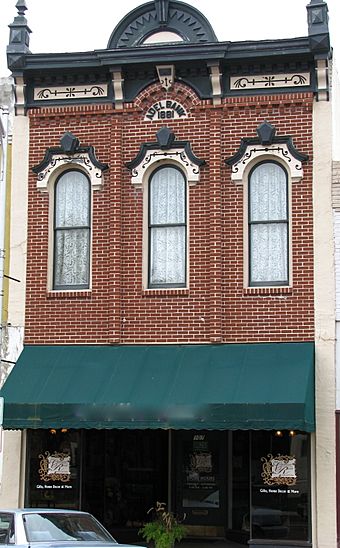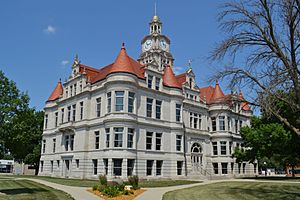Adel Public Square Historic District facts for kids
Quick facts for kids |
|
|
Adel Public Square Historic District
|
|
 |
|
| Location | About four blocks in downtown Adel centered on the public square |
|---|---|
| Area | 11.44 acres (4.63 ha) |
| Architectural style | Late Victorian Late 19th & early 20th century Revivals |
| NRHP reference No. | 09000106 |
| Added to NRHP | December 18, 2009 |
The Adel Public Square Historic District, also called The Square, is a special area in Adel, Iowa. It's recognized across the country as a historic place. It was added to the National Register of Historic Places in 2009. This means it's an important place in American history. When it was listed, it had 45 important features. These included 35 buildings that helped make it historic, one historic structure, and nine newer buildings.
Adel was first planned in 1847. It became the main town for Dallas County. The town grew a lot in the late 1800s and early 1900s. Because of this, the main shopping area also got bigger. It reached its largest size around 1917. Some parts of the east side of the square were rebuilt after World War II.
What Makes the District Special?
The Adel Public Square Historic District shows how towns grew in the past. It has many different kinds of buildings. These include shops, offices, and places for cars or farm equipment. There are also meeting halls, one house, and even places that used to hatch chickens.
Important Buildings
The district has important public buildings too. One is the Dallas County Courthouse, built in 1902. There's also the building that used to be the post office. Some buildings have been updated for county offices.
The old brick streets are also a key part of the district's history. They show how the town looked and worked long ago.
A Look Back in Time
The important historical period for this district is from 1868 to 1959. Most of the buildings you see today were built during these years. At first, many buildings were made of wood. But none of those old wooden buildings are left.
Today, most buildings are made of brick. A few buildings built after World War II are made of concrete. These materials show how building styles changed over time.
 | Lonnie Johnson |
 | Granville Woods |
 | Lewis Howard Latimer |
 | James West |




